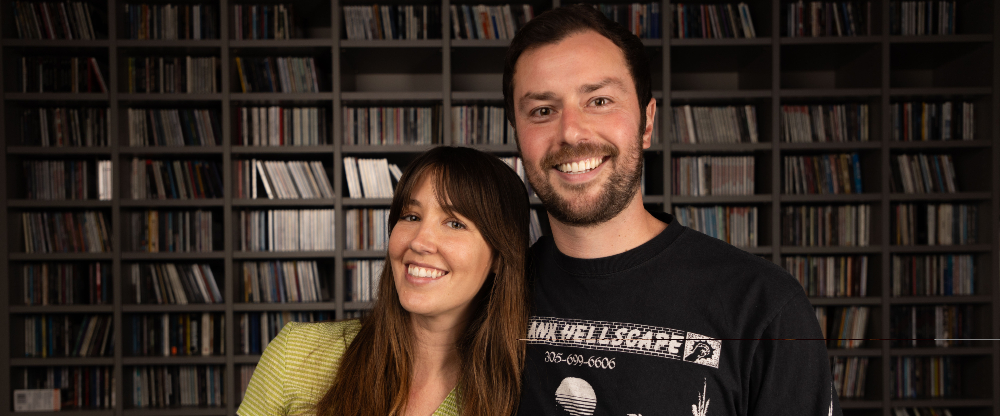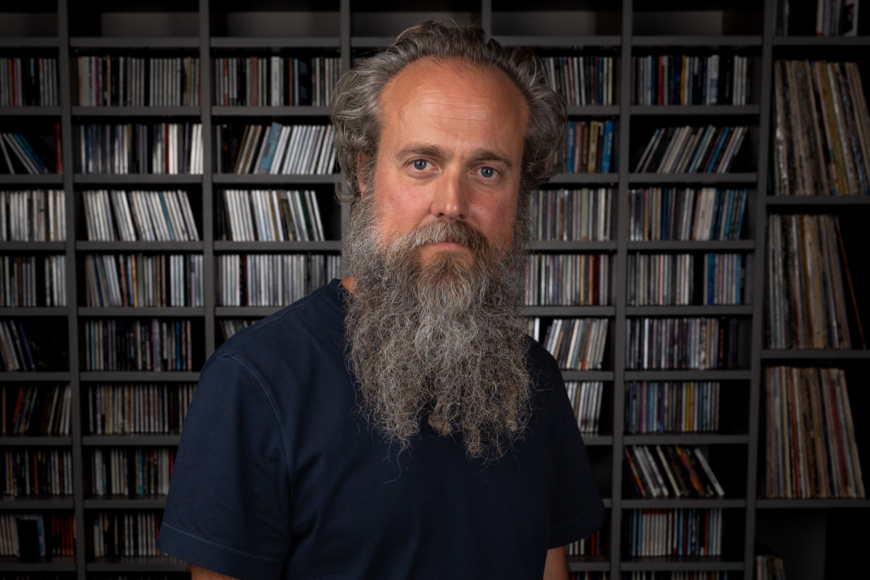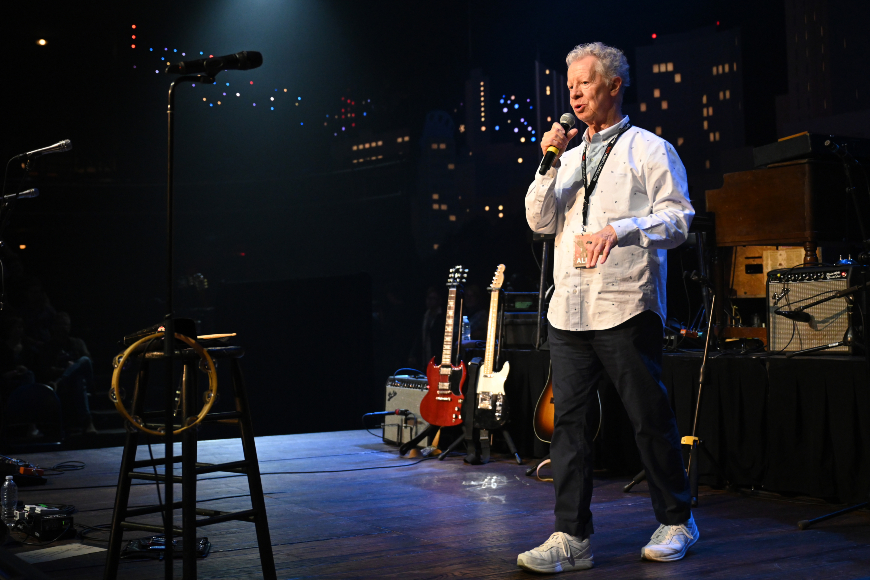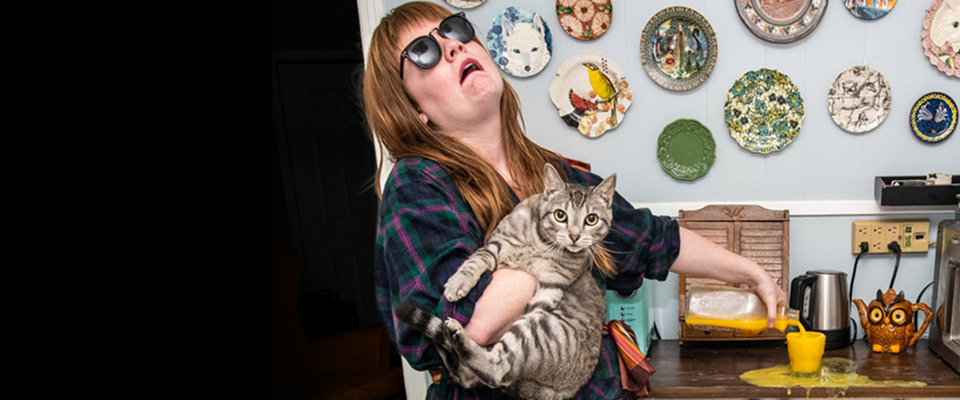Ready for something completely different on the festival spectrum? Well, it’s less than a month away from Infinite Hellscape, an eclectic West Texas showcase intimately capped at 250 attendees. Ahead of the fest’s second iteration on May 3rd, 4th, and 5th in Marathon, Marfa, and Alpine, respectively, Infinite Hellscape co-creators Shea Carley and Sam Jordan joined KUTX’s Jack Anderson for a conversation on the event’s origins, their ongoing grassroots efforts, and what to expect this time around. Get your tickets and listen back or read the abridged, edited transcript below. You can also find a playlist featuring this year’s acts at the bottom of the page.
KUTX: What is Infinite Hellscape? How did it start?
Shea Carley: Max from Blank Hellscape is a friend of mine and he was traveling through West Texas. We met up in Marfa where I live, got coffee, and were talking about throwing a house show sometime over the summer and bringing Blank Hellscape and The Infinites. Two bands, very different, but both really appreciate one another and love each other. So we had this idea to throw this house show in West Texas and then that sort of evolved into a show at the French Co. Grocer in Marathon. It was huge success, really fun. And then after that, Sam was like, “we’ve got to do this again. Let’s do it again, but bigger.”
Sam Jordan: And maybe a couple months later or something like that after the show, or even before leading up to that show, we were all jokingly calling it Infinite Hellscape just because it’s a combo of both of our bands. A few months later or so after that show, I was like, “dude, Infinite Hellscape is a really cool name for a festival”.
I messaged everybody and was like, “do y’all want to do this again”, and have it be bigger. Like we could bring in more bands. I was thinking it’d be all at the French Co., maybe eight bands total, like a mini little fest. And then the more we kind of discussed it and talked to with everybody, the more bands we started to have in mind. The reality hit us where it was like, “whoa, we don’t think that marathon can like host something like this and or the French Co. itself.” And so it evolved and we like started asking around to different places and we had a lot of candidates.
Something really cool that happened was I went out to Chateau Wright Winery for a really good friend’s wedding and I brought up, “would y’all ever want to have live music out here or like a festival?” And the owner Adam was like, “yeah, man. Let me know what the deal is.” I just started communicating with him and being like, “hey, do you think we could throw a festival here? We’ve got about like eighteen bands, seventeen bands or something.” It just evolved into a festival where people could go and camp. And, it [was] on this beautiful winery outdoors. It just went from being a little getaway show to being a real festival kind of a thing.
KUTX: When people think of West Texas music festivals, they’re usually thinking about El Cosmico. How is this different?
Shea: Our idea behind the festival is to support underrepresented artists, so artists that would not be included in that typical festival circuit. And also not having any corporate sponsorships, making this a very volunteer run, DIY run festival that’s for musicians and by musicians. So our primary aim, in addition to having those underrepresented artists and really unique artists, is being able to pay those bands fairly and also keep ticket prices affordable for everyone to participate. We don’t have the $300 ticket prices that something like Trans-Pecos has. And a lot of diverse musical acts that you would not expect to see out in the desert.
Sam: We’ve got everything from folk, ambient, to noise. We have a cumbia band this year and punk and stuff like that. So we want to just keep it like really all over the place and not as much worry about matching up bands together. We’d put a folk band right before a noise band or something like that. And we think that’s kind of how it started – with The Infinites and Blank Hellscape being two totally different bands.
Shea: But also [what’s] really important is that we try to have at least half of the bands be from West Texas. These are all artists who, for the most part, aren’t having the opportunities to play festivals outside of West Texas or even some of the other events that occur in West Texas. So showing that West Texas artists have so much to offer and then fostering those connections with Austin musicians as well.
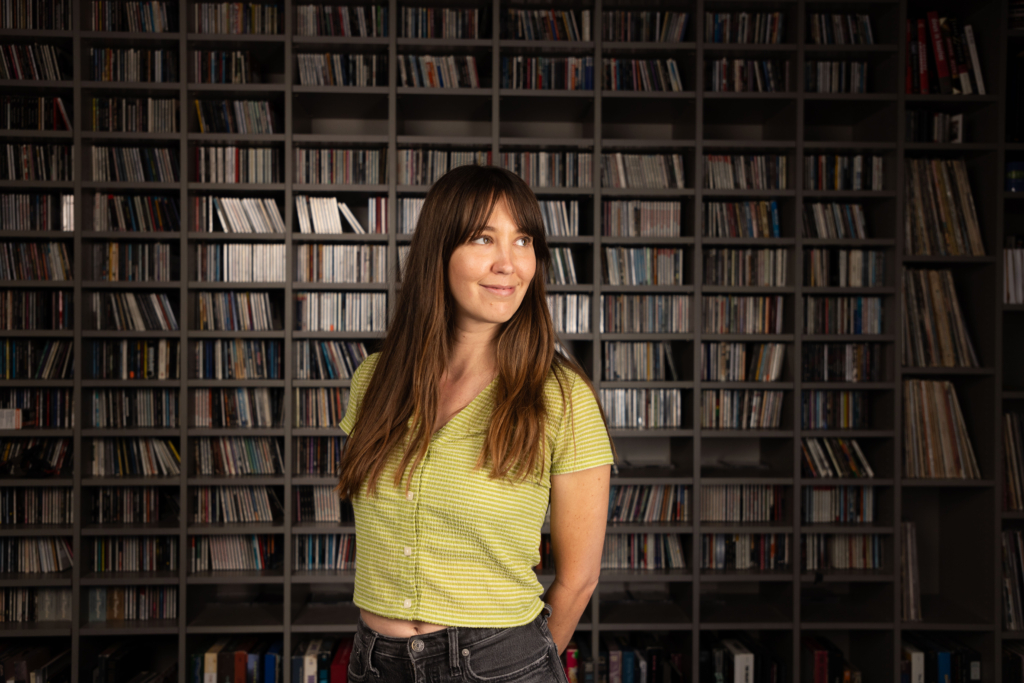
KUTX: What’s the biggest difference between West Texas and Central Texas?
Shea: Access, I think, is the biggest thing. I’ve been in far West Texas for five and a half years now, so it’s still somewhat new to it, but it is very, very remote. Three hours to the nearest legitimate hospital, the nearest city. Just generally, it is a desert of resources that also extends into support for artists, but it is a very creative community.
I mean, the Big Bend region is so inspiring. So it really draws in a lot of artists and musicians and is a great platform for being creative. But it’s that lack of access as far as getting your music out there is very different, I would say, at least that’s the difference in regards to the festival.
Sam: And when it comes to planning a festival, you have to really make sure you have all the resources and it’s as safe as possible. We’re still very DIY. But we need to make sure we have enough water for everybody. We need to make sure that there’s access to bathrooms and that everybody has food and resources that they need. ‘Cause it’s just so dry and hot. So it’s definitely different in that way too, rather than throwing a festival in the Hill Country where there’s more access to resources.
Shea: There’s also just not that many places for people to even stay out there. Something we are really aware of too is not putting strain on the communities that exist there by bringing something in. Keeping it relatively small so that it is supportive to businesses and the people living in West Texas and not stressful for them.
Sam: Yeah, we don’t want to take over. We just want to be able to assimilate into the art scene out there and be able to throw something that isn’t too stressful for the town and the resources and everything.
KUTX: The first year…was it 2022?
Sam: Yes. The full festival was 2022, September. But the first show at Marathon was in…
Shea: …July, I think, of 2021. June or July, right?
Sam: Yeah. And I think the appeal too was like peak pandemic area. Like, “we want a lot of space and want to be outside for everything”. And I think that it was a nice kind of getaway thing to do.
KUTX: So what’s different this year versus the first year? What are the big updates for Infinite Hellscape 2024?
Sam: The similarity is that we are going to do the kickoff show at the French Co. in Marathon. We thought that was a really cool thing to do because that’s where the fest originated. And then the next day we’re going to go to Marfa. So rather than be at the winery, we’re going to do the festival at The Pony in Marfa. We’ve got an outside stage for the big backyard that they have and an inside stage. It’ll be actually at a venue in the city of Marfa, so it’ll probably be somewhat easier for people to find places to stay like hotels, AirBnB, stuff like that. It’s a little bit more accommodating. With the festival in 2022, we had everybody camp out next to the [Chateau Wright] vineyard. So people were just kind of finding spots and it was really beautiful.
Shea: It was amazing. But unfortunately, neighbors were not happy about it. And that’s why we cannot do it there again. Otherwise we totally would have done it because it was so beautiful to be out there.
Sam: It was gorgeous. And I always loved the idea of a camping festival, too. That’s just really special. It’s one of my favorite things to do. But having said that, there’s places to camp in Marfa if you want to camp there as well as Airbnbs. So it’s got something for everybody there, just staying-wise, because I know a lot of people don’t exactly want to tough it out and camp for a festival. And some people do. We’ll have both of those for everybody.
And then the last difference is that we’re going to have a third show in Alpine. So I think it’s kind of cool that we’re doing Marathon, Marfa, and Alpine, bringing people to each of those cities. And they’re all relatively 30 minutes apart, more or less. That’ll be at The Ritchey and that’ll be kind of the wind-down event. The Ritchey is a really cool spot. So I’m excited to do it there as well.
KUTX: For first timers actually going out to the desert, what do you recommend attire-wise? Cause we’re coming up on early May. People are thinking, “okay, well, it’s going to be summer-ish”, but then the sun goes down...
Shea: Yeah, we have just really extreme temperature changes in the desert. May is when it starts getting hot. June is the hottest month. May can be kind of hit or miss. I think we’re going to have probably perfect weather. Springtime, you’re more likely to get hit with high winds. But. If you’re from Austin or really almost anywhere else in Texas, West Texas does not have humidity. And we do not have extreme high temperatures because we’re high desert and so we’ll only have maybe like a week out of the summer where it gets up to 100. But otherwise it’s upper 80s, low 90s, and then often dips down to lower temperatures at night.
Sam: There’s a huge difference between the climate at the Rio Grande Valley area compared to where y’all are. It’s like a 20 degree difference or more.
Shea: For May, you definitely want to bring like a jacket for night time. So it’ll probably be like short sleeves and shorts. So like warm weather, clothes, daytime, sunscreen. It’s going to be indoor, outdoor. The sun is intense. And then sweaters and jackets at night time.
KUTX: How much further do you want to take Infinite Hellscape?
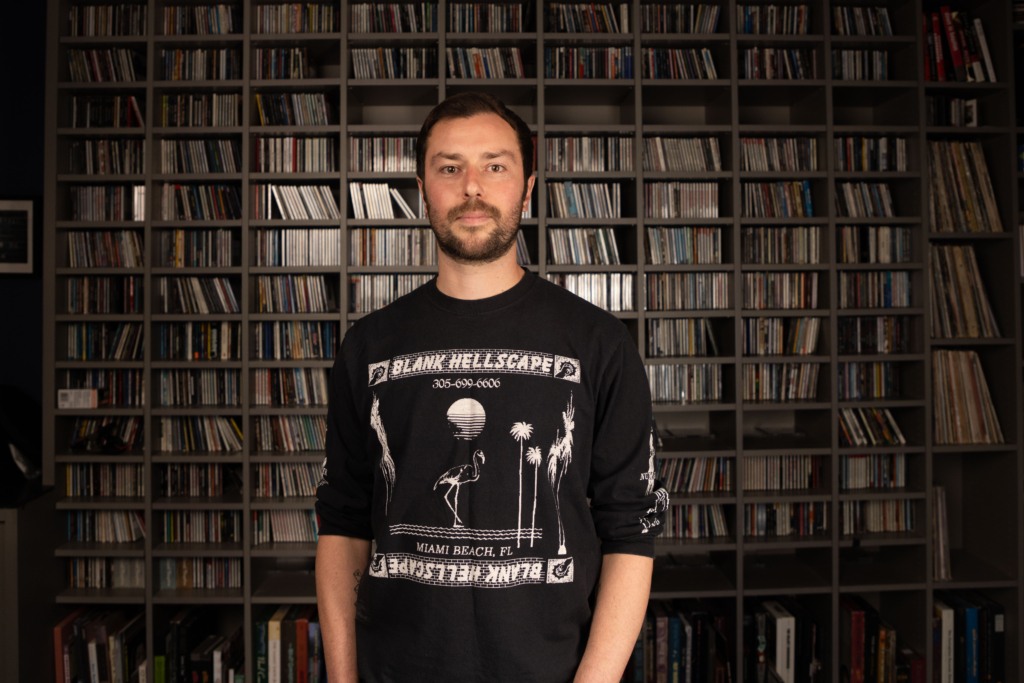
Sam: That’s a good question. I don’t know. I think not too much further because, as we were talking about earlier, we don’t want to strain the resources out there and we do like it being a DIY feel and it being volunteer.
But also to answer it, honestly, it’s like…get that special headliner that not a lot of people get to see, especially out in West Texas, but also in Austin, to someone unique.
And then have all these bands that we’re either friends with or people that we know from out in West Texas and in Austin and kind of surrounding areas. Like, we got a few bands from Denton this year and a band from Houston and [to] give them the opportunity to play with this legendary, awesome headliner that they love.
And that’s kind of the level we want it to be at. Have that special band that everybody’s a huge nerd of. And then, everybody gets that experience to like hang out with them or like, you know, have a special thing, but relatively small is I think how we want to keep it.
Shea: Keeping it small, keeping it mostly local Texas musicians, definitely not trying to make it into a Trans-Pecos. So I think the idea that it’s small and intimate and you can actually communicate with all of the people who are participating in the festival that it feels very communal, and not, you know, audience…band on stage, and there’s no interaction between the two. If you’re in a band, you don’t necessarily interact with the other participating artists. [With this] it’s not about just a business transaction. It is this community.
Sam: If we were to get to a bigger level and we had a bunch of bands that were touring and were awesome, you’d kind of miss out on like the experience of it and be like, “I don’t really have time to like look at the stars out here. I don’t really have time to communicate with everybody and talk about artwork with my friends” and stuff like that. So we want to keep that community and that vibe there with it being that smaller kind of festival.
Shea: But that said too, it would be awesome to grow enough that we are able to really pay everybody what we want to pay them…and also maybe ourselves not just go into debt by the way. [laughs] Maybe be able to at least support what we’re trying to do a little bit better rather than it just being scrambling to afford everything.
KUTX: Where do people go to get their tickets?
Sam: People can get their tickets on our event page. If you’re not an online ticket buyer, you can also come out there and buy tickets at the door. We’ll have a West Texas discount for locals out there. It’s going to be a pay-what-you-can, but here’s-what-we’re-thinking-for-door kind of a thing. We still want it to be accessible and stuff. But I would really recommend doing the Eventbrite link because we have to cap the festival at 250 people because that’s the capacity of The Pony. And that’s also probably as big as we want it to get to be manageable. The Eventbrite link is going to guarantee that you get a wristband and you can also go out there and potentially buy at the door as well.
Get your tickets to Infinite Hellscape 2024 here. And check out a playlist curated by Shea featuring acts from this year’s lineup below.
- Blank Hellscape – “Rows and Rows of People”
- The Infinites – “The Queen”
- Trunk – “Chili’s 45th and Lamar”
- Dungeon Country – “Adventures”
- Wet Dip – “Stray”
- Large Brush Collection – “Persephone”
- Plume Girl – “4get yrself”
- Flesh Narc – “VIP Passes Available”
- New Strangers – “Cold Shoulders”
- CPU Buddha – “pre-alpha build” (demo)
- Precious Gems – Live at dadaLab
- T Putnam Hill – “La humedad”
- Andrew Weathers – “Impact, Texas (Erath Overlay)”
- Thor Harris – “Day 32 of Quarantine”
- John Paul Bohon – “Laurie”
- Plastidip – “window unit” (demo)
- Greenwood – “Orange”
